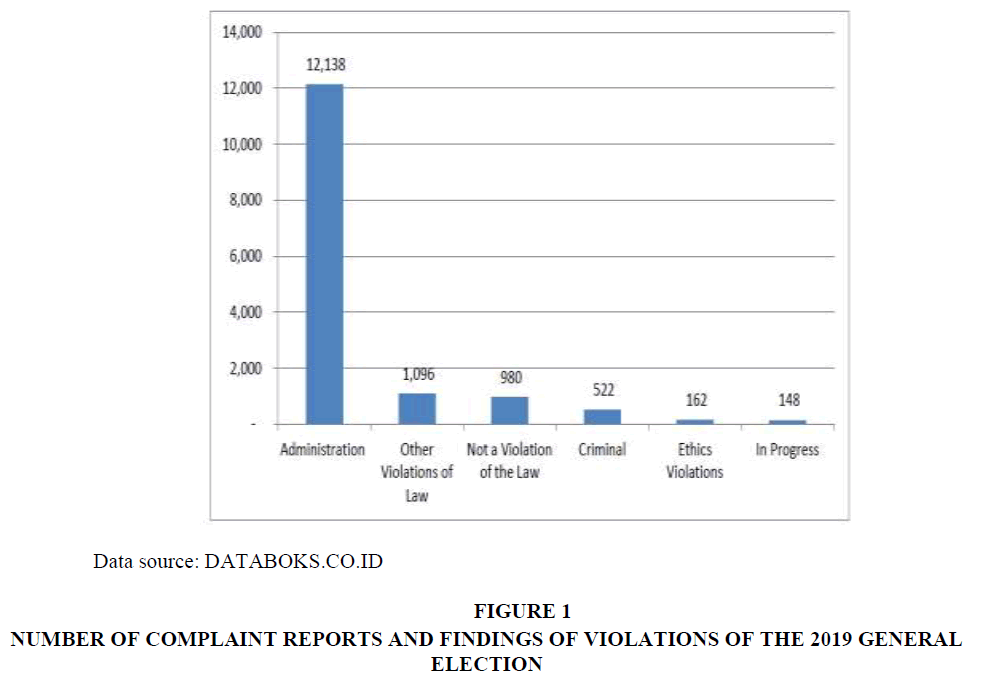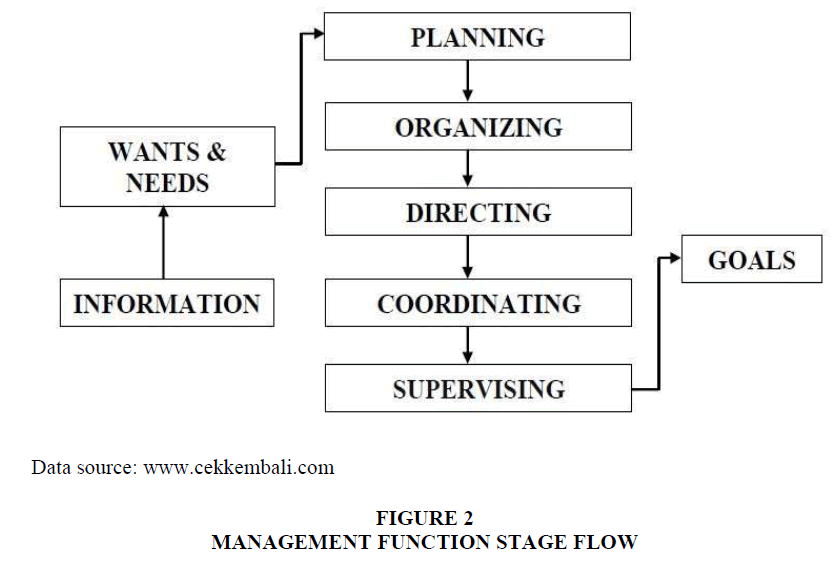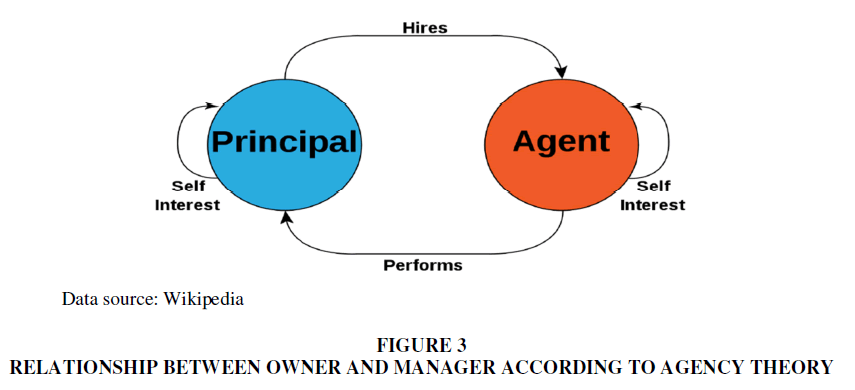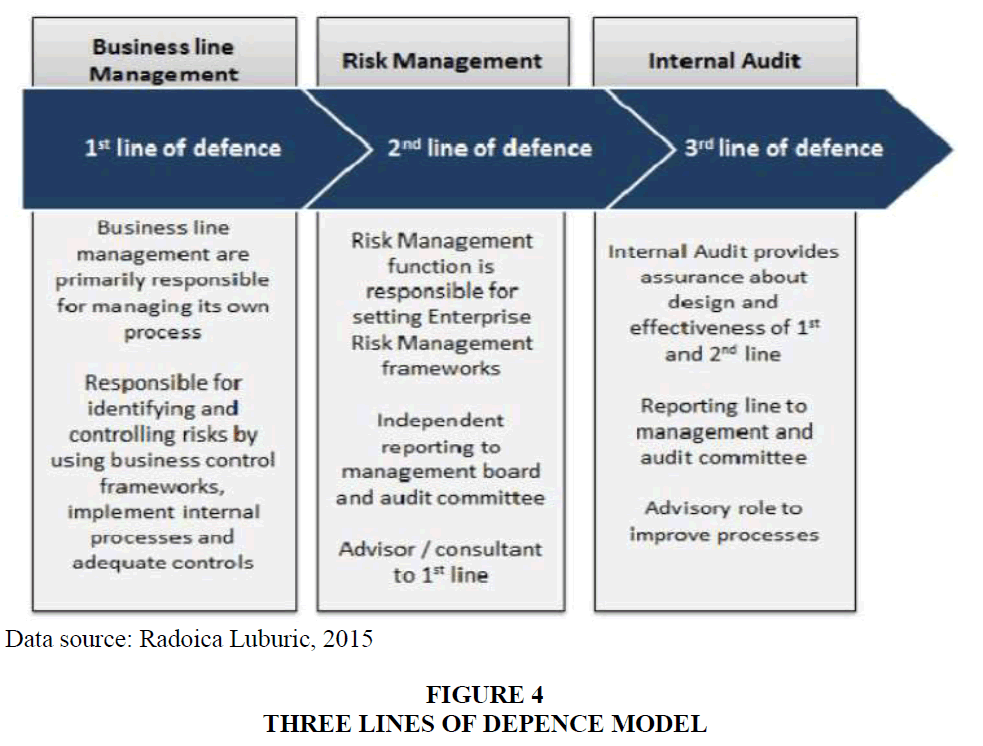Research Article: 2023 Vol: 26 Issue: 4
Improving Indonesia′s Election Supervision Function with the Three Lines of Depence Model
Syarif Usman, Sriwijaya University
Sulastri, Sriwijaya University
Marlina Widiyant, Sriwijaya University
Dan Yuliani, Sriwijaya University
Citation Information: sman, S., Sulastri, Widiyant, M., & Yulian, D. (2023). Improving indonesia's election supervision function with the three lines of depence model. Journal of Legal, Ethical and Regulatory Issues, 26(4), 1-7.
Abstract
The number of irregularities and violations in the implementation of general elections in Indonesia in recent years has greatly increased beyond the limits of reasonableness and control, so these things need to be reduced. The reduction of irregularities and violations is carried out by improving election oversight through existing Election oversight agencies and or bodies using the Three Lines of Defence model method. The supervisory functions that exist in election supervisory agencies or agencies become more empowered and optimized because there are divisions and tiers of supervision that are interrelated and mutually supportive. With the Three Lines of Defences model supervision method, the election supervision function will become better and more effective.
Keywords
General Elections, Supervision and Three Lines of Defence.
Introduction
There are still many irregularities and violations and criminal acts related to the General Elections that occurred in the 2019 simultaneous General Elections, which is indicated by the high number of complaint reports and findings of alleged violations of the 2019 General Elections recapitulated by the Election Supervisory Agency (Bawaslu) which amounted to more than 15 (fifteen) thousand, as depicted in the bar chart Figure 1 below, shows that Bawaslu will have to work harder in the 2024 General Elections in carrying out his supervisory function. The Election Supervisory Board (Bawaslu) as of May 28, 2019 received 15,052 reports and findings of violations of the 2019 general elections. A total of 522 violations fall into the criminal category, 162 violations of the code of ethics, 12,138 administration, and 1,096 other violations of the law. In addition, there were 148 violations processed and 980 non-violation reports. The high number of violations that have not been followed up and the number of reports and findings of violations of the May 2019 General Elections indicate that the role of prevention and compliance with election rules in accordance with Law No. 7 of 2017 concerning General Elections, has not been running optimally, so it is necessary to play a greater role than Bawaslu in improving the supervisory function.
Literature Review
The supervisory function is one of several functions in management that are very important for an organization (Becker & Kernan, 2003; Morrison, 1994; Schaubroeck, et al., 1993; Spector, 1982). In the PDCA (Plan Do Check Action) cycle or in the management of an activity in the form of a program or project, the supervisory function (Check) will greatly determine the success of achievement (Bafadal et al., 2019; Cotton, 2003; LaRocque et al., 2011; Purkey & Smith, 1983) and other previous functions would be ineffective. This is illustrated as shown in figure 2 below.
The supervisory function is something that needs to exist mandatorily and is also part of the governance of an organization (Holzmann & Jørgensen, 2001; Horowitz, 1983; Julia, 1996; Young, 2000), so that in the governance of the General Elections which is regulated completely and clearly in Law No.7 of 2017 concerning General Elections, which gives rise to a supervisory function through the General Election Supervisory Agency (Bawaslu). It is very clear that the functions, duties and authorities of Bawaslu related to the conduct of the General Elections in each stage are in the realm of supervision. The possibilities of irregularities and violations as well as other election crimes, have been anticipated including how to follow up with the formation and existence of Bawaslu.
There are many theories and concepts that give rise to the supervisory function, one of which is the theory of agency (Blau, 1970; Nelson & Friedlander, 2001; Tirole, 1986; Zhou & Lian, 2020). Agency theory sees that there are 3 (three) different asymmetries and interests of the owner (mandate) and the manager (who is mandated), namely the objectives, and the choice of different risks and the information they have. (Gautier & Pache, 2015; Kivistö, 2007; Rahayu, 2017; Weston & Ciccotello, 2017). The existence of these three differences makes the owner (the mandate giver) form a supervisory board, in order to eliminate and reduce differences (Benston, 1990; Harrell & McConocha, 1992; McLaughlin, 2010; Syarif Usman, 2021; Waldman & Yammarino, 1999).
If the owner or mandate giver is the voting public, then the government is the mandated manager, which in running the government will be supervised by the institutions of the House of Representatives (DPR) and the Regional Representative Council (DPD). Likewise, in the context of holding general elections every 5 (five) years, according to the mandate of the 1945 Constitution, which is a mandate from the people (owners) to the government (managers) to organize them. Here it is clear that the interests of the people to live a prosperous and prosperous life, whether it will be in line with what the government is doing which will also prosper its people. Meanwhile, in the context of the implementation or implementation of general elections with each stage is a mandate that must be carried out by the Government as the owner of interests representing the people, which in theory the agency is considered the owner while the executor and organizer of the General Elections, the Government establishes and assigns the General Election Commission (KPU) as the manager of its implementation, which must be someone to supervise it. Bawaslu serves as a supervisory board for the duties that have been mandated to the KPU, as well as a bridge and liaison between the people and the Government and the KPU as the organizer/implementer, so that all the interests of the people represented by the Government are accommodated. The government as the owner, is interested in making the General Elections run successfully and smoothly and as planned, while the KPU and other devices including surveillance devices are trying their best to achieve it. The relationship between owner and manager in agency theory is illustrated in figure 3 below.
Discussion
According to Law Number 7 of 2017 concerning General Elections, the principles of the implementation of General Elections are Direct, General, Free and Confidential or abbreviated as LUBER and Honest and Fair which is abbreviated as Jurdil, so that the supervision carried out will see and assess the extent to which the implementation of these principles during the implementation takes place. Are there violations of the provisions of these principles? If a violation occurs, penalties and penalties must be given to violators, in accordance with applicable legal rules and norms, as regulated in Law Number 7 of 2017.
The supervisory function must meet the principles or principles of good governance, namely transparency, accountability, responsibility, independence and fairness (TARIF), in addition to being objective. Whether or not supervision is good will largely depend on whether or not the principle/principles are in place. The principles or principles of TARIF and objectives have been accommodated in the articles and paragraphs of Law No.7 of 2017 concerning General Elections. For example, the stages of counting votes are carried out in a transparent, accountable, responsive, independent, fair/fair and objective manner.
The supervisory function of the General Election according to Law No.7 of 2017 can be likened and modeled with 3 (three) layers of defense/supervision (Davies & Zhivitskaya, 2018; Luburić, 2017; Luburic et al., 2015; Mabwe et al., 2017). The first layer of supervision function is carried out by the implementer/manager himself or commonly known as inherent supervision (waskat), which in the supervision of the General Elections is carried out by the KPU itself, starting from the Central KPU, Provincial KPU, Regency/City KPU, District Election Committee (PPK) and Voting Committee (PPS) including the Voting Organizing Group (KPPS). The second layer of supervision function is carried out by a special institution or unit that is indeed formed with the main task of supervising the activities, a project or program carried out, which in government organizations / agencies is called the Inspectorate, or in non-governmental organizations called the Internal Supervision Unit (SPI). In the supervision of the General Elections, the supervision in the second tier is carried out by Bawaslu, starting from Central Bawaslu, Provincial Bawaslu, District/City Bawaslu, PPK Panwaslu and PPS Panwaslu. Meanwhile, the supervisory function in the third layer is carried out by external supervisors or auditors, such as Public Accounting Firms for companies, cross- sectoral inspectorates or higher, the Financial Audit Agency (BPK) and the Financial and Development Supervision Agency (BPKP). In election supervision, this thirdtier supervisory function is carried out by the DKPP (Honorary Council of Election Organizers) and Election Monitoring agencies.
The First Line of Defence is in Business Line Management which manages processes in its own work units, which is responsible for identifying and controlling risks using a business control framework, the implementation of internal processes and adequate process adequacy. The second line of defence is a risk management unit that carries out the risk management functions of a company that reports to the Board of Directors and commissioners through an audit committee, acting as a consultant or advisor to the first line of defence. The third line of defence is an internal audit unit that provides assurance regarding the design and effectiveness of the functioning of the first line and second line of defence work units.
With a 3 (three) layer supervision system, it is hoped that deviations, violations and criminal acts related to the General Election can be selectively filtered according to the scale of priorities and their impact and further streamline election supervision. An overview of the Three Lines of Depence system is as shown in figure 4 below.
Increasing the supervisory function in the implementation of the General Elections is an increase in prevention and actions taken for irregularities and violations as well as criminal acts related to the General Elections carried out by parties involved in the implementation / implementation of the General Elections, such as General Election Participants, KPU, Government officials (PNS) ranging from central to regional officials and the community. The automatic enhancement of the surveillance function is an increase in supervision at each of the three layers of surveillance in the Three Lines of Depence system. Supervision is inherent in the implementing institutions of the General Elections, in this case the KPU, starting from the Central KPU, Provincial KPU, Regency/City KPU, PPK and PPS, is further improved, such as by means of the recruitment of KPU commissioners and KPU members, including PPK and PPS, more selective elections to get candidates who have AKHLAK (Amanah, Kompeten, Harmonis, Loyal, Adaptive and Collaborative) and have integrity. Likewise, the improvement of the supervisory function is overlaid with the second supervision by means of recruiting prospective members of Bawaslu, Panwaslu PPK and Panwaslu PPS which are more selective in order to get prospective members who have AKHLAK and integrity. The improvement of the supervisory function is also not only carried out on its human resources but also improvements to the system such as improvements to the rules for implementing the General Elections such as KPU regulations, including Law No. 7 of 2017.
Conclusion
Indirectly, the supervisory function of the General Elections will increase and is much better if all parties involved and interested (stakeholders) obey and obey the rules and apply the principles of the supervisory function that are transparent, accountable, responsible, and independent and fairness. Especially if all stakeholders put forward and uphold the principle of conducting direct, free, and secret and honest and fair elections, which will make the implementation of general elections more successful and smooth and better than the holding of general elections in previous years.
References
Bafadal, I., Nurabadi, A., Sobri, A.Y., & Gunawan, I. (2019). The competence of beginner principals as instructional leaders in primary schools. International Journal of Innovation, Creativity and Change, 5(4), 625-639.
Becker, T.E., & Kernan, M.C. (2003). Matching commitment to supervisors and organizations to in-role and extra-role performance. Human performance, 16(4), 327-348.
Indexed at, Google Scholar, Cross Ref
Benston, G.J. (1990). Universal banking. The Separation of Commercial and Investment Banking, 179-214.
Blau, P.M. (1970). A formal theory of differentiation in organizations. American Sociological Review, 201-218.
Indexed at, Google Scholar, Cross Ref
Cotton, K. (2003). Principals and student achievement: What the research says.
Davies, H., & Zhivitskaya, M. (2018). Three lines of defence: a robust organising framework, or just lines in the sand? Global Policy, 9, 34-42.
Indexed at, Google Scholar, Cross Ref
Gautier, A., & Pache, A.C. (2015). Research on corporate philanthropy: A review and assessment. Journal of Business Ethics, 126(3), 343-369.
Indexed at, Google Scholar, Cross Ref
Harrell, G.D., & McConocha, D.M. (1992). Personal factors related to consumer product disposal tendencies. Journal of Consumer Affairs, 26(2), 397-417.
Indexed at, Google Scholar, Cross Ref
Holzmann, R., & Jørgensen, S. (2001). Social risk management: A new conceptual framework for social protection, and beyond. International Tax and Public Finance, 8(4), 529-556.
Indexed at, Google Scholar, Cross Ref
Horowitz, D.L. (1983). Decreeing organizational change: Judicial supervision of public institutions. Duke LJ, 1265.
Indexed at, Google Scholar, Cross Ref
Julia, B. (1996). Constitutionalising self-regulation. Mod. L. Rev., 59, 24.
Indexed at, Google Scholar, Cross Ref
Kivistö, J. (2007). Agency theory as a framework for the government-university relationship. Tampere University Press.
Indexed at, Google Scholar, Cross Ref
LaRocque, M., Kleiman, I., & Darling, S.M. (2011). Parental involvement: The missing link in school achievement. Preventing school failure, 55(3), 115-122.
Indexed at, Google Scholar, Cross Ref
Luburić, R. (2017). Strengthening the three lines of defence in terms of more efficient operational risk management in central banks. Journal of Central Banking Theory and Practice, 6(1), 29-53.
Indexed at, Google Scholar, Cross Ref
Luburic, R., Perovic, M., & Sekulovic, R. (2015). Quality management in terms of strengthening the" three lines of defence" in risk management-process approach. International Journal for Quality Research, 9(2), 243.
Mabwe, K., Ring, P., & Webb, R. (2017). Operational risk and the three lines of defence in UK financial institutions: is three really the magic number? Journal of Operational Risk, Forthcoming.
Indexed at, Google Scholar, Cross Ref
McLaughlin, T.A. (2010). Nonprofit mergers and alliances. John Wiley & Sons.
Morrison, E.W. (1994). Role definitions and organizational citizenship behavior: The importance of the employee's perspective. Academy of Management Journal, 37(6), 1543- 1567.
Indexed at, Google Scholar, Cross Ref
Nelson, M.L., & Friedlander, M.L. (2001). A close look at conflictual supervisory relationships: The trainee's perspective. Journal of Counseling Psychology, 48(4), 384.
Indexed at, Google Scholar, Cross Ref
Purkey, S. C., & Smith, M. S. (1983). Effective schools: A review. The elementary school journal, 83(4), 427-452.
Indexed at, Google Scholar, Cross Ref
Rahayu, N. W.I. (2017). Good service governance using multiple agency in the management of zakat. International Journal of Management and Administrative Sciences (IJMAS), 4(6).
Indexed at, Google Scholar, Cross Ref
Schaubroeck, J., Ganster, D.C., Sime, W.E., & Ditman, D. (1993). A field experiment testing supervisory role clarification. Personnel psychology, 46(1), 1-25.
Indexed at, Google Scholar, Cross Ref
Spector, P.E. (1982). Behavior in organizations as a function of employee's locus of control. Psychological bulletin, 91(3), 482.
Indexed at, Google Scholar, Cross Ref
Syarif Usman, S., Marlina Widiyanti, & Yuliani. (2021). Commissioner's Role in The Implementation of Good Corporate Governance is reviewed from the Perspective of Agency Theory. International Journal of Business Management & Economic Research, 12(1), 1878 - 1883.
Tirole, J. (1986). Hierarchies and bureaucracies: On the role of collusion in organizations. The Journal of Law, Economics, and Organization, 2(2), 181-214.
Indexed at, Google Scholar, Cross Ref
Waldman, D.A., & Yammarino, F.J. (1999). CEO charismatic leadership: Levels-of- management and levels-of-analysis effects. Academy of Management Review, 24(2), 266- 285.
Indexed at, Google Scholar, Cross Ref
Weston, H., & Ciccotello, C. (2017). Flash traders (milliseconds) to indexed institutions (centuries): The challenges of an agency theory approach to governance in the era of diverse investor time horizons. Seattle UL Rev., 41, 613.
Young, D.R. (2000). Alternative models of government-nonprofit sector relations: Theoretical and international perspectives. Nonprofit and voluntary sector quarterly, 29(1), 149-172.
Indexed at, Google Scholar, Cross Ref
Zhou, X., & Lian, H. (2020). Modes of governance in the Chinese bureaucracy: A “control rights” theory. The China Journal, 84(1), 51-75.
Indexed at, Google Scholar, Cross Ref
Received: 17-Apr-2023, Manuscript No. JLERI-23-13496; Editor assigned: 19-Apr-2023, Pre QC No. JLERI-23-13496(PQ); Reviewed: 05-May-2023, QC No. JLERI-23-13496; Revised: 11-May-2023, Manuscript No. JLERI-23-13496(R); Published: 18-May-2023



